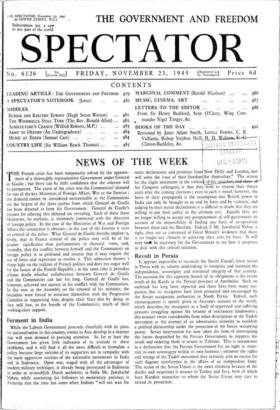NEWS OF THE WEEK DEC 0194! .5 rr HE French crisis
has been temporarily solved by the appoint-
. ment of a thoroughly representative Government under General de Gaulle ; but there can be little confidence that the solution will
be permanent. The cause of the crisis was the Communists' demand for one of the key Ministries of Foreign Affairs, War or the Interior ; the demand cannot be considered unreasonable as the Communists are the largest of the three parties from which General de Gaulle has been directed to form his Government. General de Gaulle's reasons for refusing this demand are revealing. Each of these three Ministries, he explains, is intimately connected with the direction of foreign policy. In the case of the Ministries of War and Foreign Affairs the connection is obvious ; in the case of the Interior it rests on control of the police. What General de Gaulle thereby implies is, firstly, that in France control of the police may well be of far greater significance than parliamentary or electoral votes, and, secondly, that the conflict between himself and the Communists on foreign policy is so profound and intense that it may require the use of force and repression to resolve it. This admission throws a sharp light on the realities of French politics and does not augur well for the future of the Fourth Republic ; at the same time it provokes serious doubt whether collaboration between General de Gaulle and the Communists can last fot long. General de Gaulle has, however, achieved one success in his conflict with the Communists. In the vote in the Assembly on the renewal of his mandate, the Socialists were forced to associate themselves with the Progressive Catholics in supporting him, despite their fears that by doing so :hey will lose, to the benefit of the Communists, much of their vorking-class support.


























